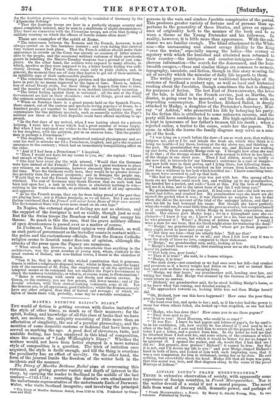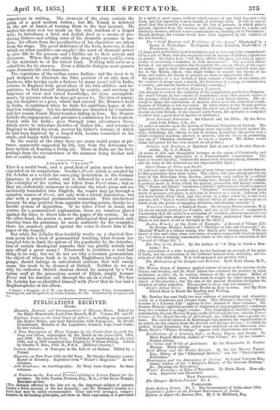AINSLIE YOUNG'S FRANK X]IRRYWEATHER. * THERE is extensive observation of society,
with apparently some experience of foreign countries, in Frank Merryweather. Nor is the writer devoid of a social if not a moral purpose. The novel fails from want of literary skill, dramatic power, and perhaps of Frank Merryweather: a Novel. By Henry G. Ainslie Young, Esq, In two volumes. Published by Newby. experience in writing. The elements of the story contain the germ of a good modern fiction; but Mr. Young is deficient
in the art or knack of turning them to the best account. He
makes his story rest too much on the stale incident of a forged will ; he introduces a fatal and foolish duel as a means of pro-
ducing distress and setting some of his dramatis personm in mo- tion; his effects from the peculiarities of his characters are taken from the stage. The great deficiency of the book, however, is that which no other qualities can supply—the want of dramatic power to give life to his persons and a lifelike air to their actions and discourse. Where this gift exists the story will run readily, even if the materials be of the tritest kind. Nothing will serve as a substitute for its absence. Even a didactic dialogue must possess some dramatic life and character.
The experience of the author seems Indian ; and the story is in part designed to illustrate the false position of an able man of business, who having made a fortune by many years' toil in India, returns to England with great ideas of his own abilities and im- portance, to find himself disregarded by society, and outshone in largeness of view and varied knowledge, let alone accomplish- ments, by persons whom he does get access to. The idea of marry- ing his daughter to a peer, which had entered Mr. Munroe's head in India, is confirmed when he finds his ambitious hives of dis- tinction vanishing: but his intentions are thwarted by Constance and heir °engin Frank Merryweather falling in love. Mr. Munroe forbids the engagement, and procures a commission for his nephew. Frank sails for India ; goes through some adventures there, which serve to introduce sketches of Indian life ; and returns to England to defeat his rival, recover his father's fortune of which he had been deprived by a forged will, become reconciled to his uncle, and happy with oiastance. In the course of the story there are many social scenes or pic- tures, apparently suggested by life, but, from the deficiency we have spoken of, wanting a living air. Those in India are the best, perhaps from the circumstance of the manners being fresher and I not so readily tested.



























 Previous page
Previous page